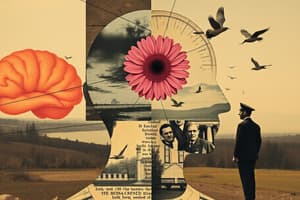Podcast
Questions and Answers
What is the main focus of Katherine Rafe's systemic organization approach?
What is the main focus of Katherine Rafe's systemic organization approach?
- Understanding the impact of culture on personal growth (correct)
- Examining the influence of social media on identity formation
- Analyzing the role of genetics in shaping human behavior
- Developing strategies for teaching group harmony
What is the comparison made by Wraith in describing development?
What is the comparison made by Wraith in describing development?
- A two-way conversation between a person and their culture (correct)
- A random process of trial and error
- A one-way transmission of cultural values
- A solo journey of self-discovery
How do cultural values influence an individual's actions and relationships?
How do cultural values influence an individual's actions and relationships?
- They are irrelevant to personal growth and development
- They have no impact on individual behavior
- They shape one's worldview and social interactions (correct)
- They only affect group dynamics, not individual actions
What is the primary benefit of understanding a child's cultural background in education?
What is the primary benefit of understanding a child's cultural background in education?
How do Eastern cultures, like those in Japan, often approach community and individuality?
How do Eastern cultures, like those in Japan, often approach community and individuality?
What is the significance of Rafe's approach in understanding child development?
What is the significance of Rafe's approach in understanding child development?
What is a potential outcome of a culture that encourages open discussions and debates?
What is a potential outcome of a culture that encourages open discussions and debates?
What is a key aspect of Rafe's approach in supporting children's development?
What is a key aspect of Rafe's approach in supporting children's development?
Match the following types of cultural capital with their definitions:
Match the following types of cultural capital with their definitions:
Match the following benefits of cultural capital with their outcomes:
Match the following benefits of cultural capital with their outcomes:
Match the following ways of acquiring cultural capital with their descriptions:
Match the following ways of acquiring cultural capital with their descriptions:
Match the following consequences of cultural capital with their effects:
Match the following consequences of cultural capital with their effects:
Match the following aspects of cultural capital with their characteristics:
Match the following aspects of cultural capital with their characteristics:
Match the following outcomes of cultural capital with their consequences:
Match the following outcomes of cultural capital with their consequences:
Match the following types of cultural capital with their examples:
Match the following types of cultural capital with their examples:
Match the following ways of using cultural capital with their effects:
Match the following ways of using cultural capital with their effects:
Study Notes
Katherine Rafe's Systemic Organization Approach
- Examines how people grow and change by considering everything that affects them, including thoughts, actions, and people around them.
- Reveals how culture deeply influences various aspects of our lives.
Understanding Development as a Two-Way Conversation
- Development is a process of exchange between a person and their culture.
- People internalize cultural rules, sometimes question or challenge them, and shape their personal growth.
- Example: A teenager may follow some family traditions while questioning others, helping them figure out who they are.
Cultural Values and Influence
- Different cultures value different things:
- Western cultures (e.g., United States): emphasize independence and individual choice.
- Eastern cultures (e.g., Japan): emphasize community and working together for the group.
- Cultural values influence how people act and relate to others.
- Understanding a child's cultural background can help teachers and parents find better ways to educate and guide them.
Education and Parenting
- Incorporating cultural values into education can make learning more comfortable and effective.
- Example: A teacher aware of a child's cultural background can incorporate group activities, promoting harmony and effective learning.
- Rafe's approach highlights the importance of considering the whole environment, including cultural values and norms, to support each child's development.
- Respecting and valuing a child's cultural background can lead to more effective education and parenting.
Cultural Capital
- Cultural capital refers to non-monetary assets a person has, such as education, way of speaking, manners, and appearance.
- According to Pierre Bourdieu, there are three types of cultural capital: embodied, objectified, and institutionalized.
Embodied Cultural Capital
- Embodied cultural capital includes skills, knowledge, and behaviors learned over time, mainly from family and education.
- Examples include speaking a certain way or having good table manners.
- It's not just about what you know, but also about how you present what you know.
Objectified Cultural Capital
- Objectified cultural capital involves physical objects showing off cultural knowledge, such as books, musical instruments, or art.
- Owning these objects can demonstrate cultural knowledge and be used to help others learn.
Institutionalized Cultural Capital
- Institutionalized cultural capital refers to formal recognition of cultural knowledge through diplomas and certificates.
- Examples include having a college degree, which shows that an institution has recognized your knowledge and skills.
Importance of Cultural Capital
- Cultural capital helps people navigate social structures and influences opportunities available to them, such as getting a good job or being accepted into a prestigious school.
- It affects who gets ahead in society and who doesn't.
- Cultural capital can lead to social inequality, as those with a lot of cultural capital often pass it down to their children, keeping the same families wealthy and powerful over generations.
Conclusion
- Bourdieu's idea of cultural capital explains how culture affects social mobility and inequality.
- It highlights the importance of having certain cultural skills and knowledge for personal success and understanding social inequalities.
Studying That Suits You
Use AI to generate personalized quizzes and flashcards to suit your learning preferences.
Description
This quiz explores Katherine Rathje's systemic organization approach to understanding human growth and change, focusing on how culture influences our thoughts, actions, and interactions with others.




